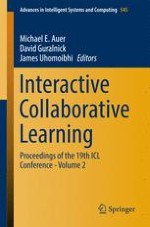2017 | OriginalPaper | Buchkapitel
Blended Learning and Fundamental Disciplines
verfasst von : Konstantin B. Fedorov, Olga N. Imas, Anna I. Sherstneva, Stanislav V. Kriviakov
Erschienen in: Interactive Collaborative Learning
Aktivieren Sie unsere intelligente Suche, um passende Fachinhalte oder Patente zu finden.
Wählen Sie Textabschnitte aus um mit Künstlicher Intelligenz passenden Patente zu finden. powered by
Markieren Sie Textabschnitte, um KI-gestützt weitere passende Inhalte zu finden. powered by
